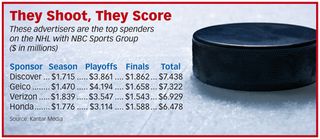It's Game On for NBC Sports

With the National Hockey League getting its Zambonis warmed up after ending a lockout that cost half of its regular season, NBC Sports is looking to thaw out advertisers’ cold cash.
After reaching a tentative agreement with its players, the league is expected to play a shortened 48-game schedule that could start Jan. 19. According to reports, the playoffs could stretch until the end of June.
NHL sponsors will be glad to see slap shots and kick saves again. “How can I say anything except ‘Welcome back, hockey,’” says Aaron Cohen, executive VP for national broadcast at Horizon Media, whose clients include Geico, one of the top spenders on NHL hockey. “We wanted a full season. We’re happy to get what we can at the moment.”
Hockey’s labor issues cast a shadow on what had been a strong 2012 for NBC Sports, highlighted by a record-setting Super Bowl, a resurgence in Notre Dame football (getting swamped by Alabama in the BCS Championship game notwithstanding) and the London Olympics, which turned a surprising profit.
The NHL lockout cost NBC its New Year’s Winter Classic outdoor game and the still-new NBC Sports Network its main attraction. And it lost a penalty box full of ad dollars. Advertisers spent $53 million on nationally televised regular-season NHL games on NBC and the NBC Sports Network (formerly Versus) last season, plus $124 million on the playoffs, including $39 million during the Stanley Cup Finals, according to Kantar Media.
“We’ve certainly lost a considerable amount because of the work stoppage,” says Seth Winter, executive VP for sales and marketing at NBC Sports Group. “There’s a lot of revenue that we won’t necessarily know we lost because people spent around us not knowing if there would be hockey.”
Winter says NBC did what it could for sponsors as games got cancelled. “We had an obligation to the advertisers to try to help them keep as many appropriate ratings points and impressions in the marketplace, so we diverted [some of their hockey money] to NFL and collegiate football. But that hurts us badly, because every time we take a hockey impression and convert it to an NFL or college impression, it takes that impression out of sale.”
And not all advertisers took NBC up on its offers. Cohen says that while NBC did a good job of staying in touch and updating Geico on the latest developments at the bargaining table, the insurance company already had a football budget and “the hockey money was hockey money.” When games didn’t get played, Geico got its money back. “If it doesn’t run, you don’t pay for it,” Cohen says. “If you buy hockey, you want hockey. If you’re buying spots, you can take something else.”
For NBC, a shortened season doesn’t necessarily mean that spending will stay the same with sponsors buying more spots per game.
“Advertisers want certain unit loads in games. If they think that three or four units a game is the right amount of exposure to have in a game, they’re not just going to buy eight units and move them up,” Winter says. Some advertisers might move from two units to three units per game, but it would be wrong to assume that inventory will be tight as the season gets underway, he says.
And it remains to be seen how much media spending the league’s official sponsors will have to commit to in a truncated season. “The league did a pretty good job of talking to some of the big sponsors,” Winter says. “We’ll figure out how we’re going to place their media based on the new schedule.”
Now NBC has to get back into the market to revive interest and convince sponsors that hockey is a good investment. Winter says hockey delivers elusive young upscale men. “It’s one of the most difficult demographics to reach,” even for other sports in the first half of the year.
The return of hockey is especially good for the NBC Sports Network, which took a big hit from the lockout. The network had to buy programming to replace the NHL. And hockey brought a certain level of circulation to the network; not having it hurt other shows.
Fortunately for NBC, the NHL is expected to have a full playoff schedule, which drives ratings and revenue. And once the playoffs start, it will be business as usual because sponsors already have their budgets in place, Winter says.
All of this assumes viewers come back when the puck drops. Winter is optimistic. So is media buyer Cohen.
“I think they’re coming into a void, because football is done, and so I think there is going to be some interest in seeing what hockey looks like,” says Cohen, who thinks ratings could be back to normal by the playoffs. “If there are good games and the players seem energized by it, then I think it’s going to be fine.”
E-mail comments to jlafayette@nbmedia.com and follow him on Twitter: @jlafayette
Broadcasting & Cable Newsletter
The smarter way to stay on top of broadcasting and cable industry. Sign up below
Jon has been business editor of Broadcasting+Cable since 2010. He focuses on revenue-generating activities, including advertising and distribution, as well as executive intrigue and merger and acquisition activity. Just about any story is fair game, if a dollar sign can make its way into the article. Before B+C, Jon covered the industry for TVWeek, Cable World, Electronic Media, Advertising Age and The New York Post. A native New Yorker, Jon is hiding in plain sight in the suburbs of Chicago.

